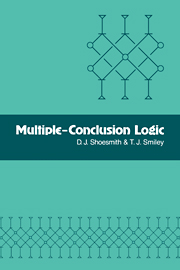Book contents
15 - Many-valuedness
Published online by Cambridge University Press: 06 July 2010
Summary
Cancellation
It is sometimes held that one proposition cannot entail another unless there is some connection of meaning between them. We are interested in a related principle, namely that unless there is a connection of meaning between two propositions there cannot be a connection between their truth or falsity. This represents a generalisation of the entailment principle as far as contingent propositions are concerned, but leaves open such questions as whether p&∼p entails q or whether p entails q∨∼q. For suppose that there is no connection of meaning between two propositions. By our principle it follows that the truth or falsity of either one is not constrained or conditioned by that of the other; i.e. if they can be true separately they can be true simultaneously, if they can be false separately they can be false simultaneously, and if one can be true and the other false separately they can be so simultaneously. When the propositions concerned are contingent each of these conditionals has a true antecedent, and so we may conclude from the last of them that it is possible for either proposition to be true while the other is false. It therefore follows - on any account of entailment - that neither entails the other. When either of the propositions is necessary or impossible, however, there is no way of drawing such a conclusion from our principle.
Our principle refers to a pair of propositions, but it can be made to cover an arbitrary family instead of a pair and arbitrary sets of propositions instead of individual propositions.
Information
- Type
- Chapter
- Information
- Multiple-Conclusion Logic , pp. 270 - 282Publisher: Cambridge University PressPrint publication year: 1978
